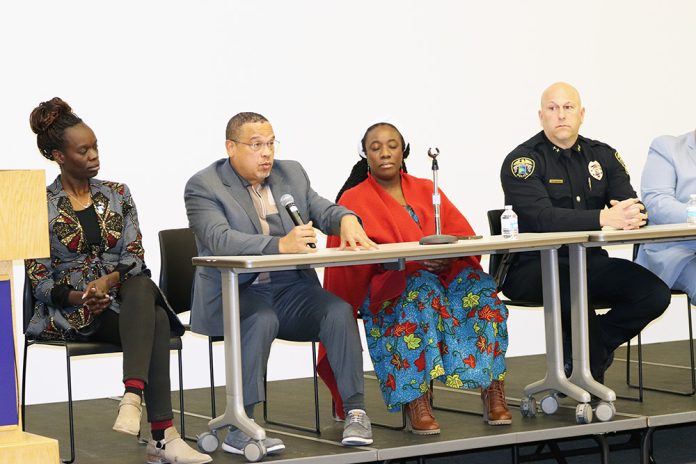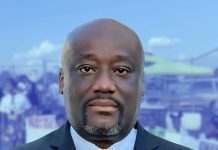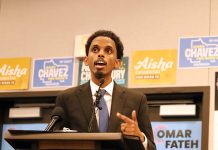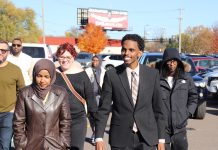

Minnesota House Rep. Huldah Momanyi Hiltsley, whose family once faced deportation, hosted a Thursday night immigration town hall to listen to constituents’ concerns as President Donald Trump’s campaign promise of arresting and deporting those without legal status becomes a reality.
Hiltsley, DFL-Brooklyn Park, was joined by Attorney General Keith Ellison, Hennepin County Attorney Mary Moriarty, Brooklyn Park Police Chief Mark Bruley and immigration attorneys from various organizations such as Advocates for Human Rights.
This was Hiltsley’s first town hall since being sworn-in last month. Given the matter being discussed, her office livestreamed the event to those unable to attend in person out of fear, or for convenience.
Those present at the town hall were able to ask their own questions while Africa Let’s Talk host Collins Oppong read a series of submitted questions from the livestream audience for the panel to answer.
The lawyers at the town hall emphasized that those without legal status still enjoy constitutional rights, such as the right to remain silent when immigration agents show up. If the agents knock at your door, you need to demand that they identify themselves and even then, there is no obligation to let them inside – unless they have a judicial warrant and not an administrative warrant. The difference between the two types of warrants is that a judicial warrant is signed by a state or federal judge while an administrative warrant as the name implies is by an agency such as ICE or another federal agency.
Since Trump took office again last month, Hiltsley said she has heard from many of her constituents that are targets of the president’s executive actions, especially those relating to immigration.
“There is a lot of fear in our community as many might not fully understand what the executive orders mean, that is why I felt it was important we have this (town hall) so the community has the right information from the experts in the field such as the lawyers and AG Ellison, as well as our county attorney Moriarty,” Hiltsley said.
The number of people living in Minnesota without legal status is estimated to be around 82,000 as of 2022, with migrants from Mexico and South America accounting for close to 60% of the number while those from Africa account for 14% of the unauthorized population, according to the Migration Policy Institute.
In 2024, U.S. Immigration and Customs Enforcement (ICE) deported 1,818 individuals from African countries, according to its annual report.
As Trump was sworn into office in January, ICE’s Enforcement and Removal Operations (ERO) – in its latest report – had 41,323 individuals from African countries in its Final Orders of Removal list, with the top 10 African countries being Somalia with the most, followed by Mauritania, Nigeria, Ghana, Guinea, Cameroon, Ethiopia, Senegal, Liberia and Sierra Leone.
Being on the final orders of removal list does not mean it is an open and shut case and that one must be deported, as there might be other relief or protection available to the affected individual – such as asylum.
Attorneys at the town hall stressed the importance of being prepared incase one is arrested – such as memorizing your immigration attorney’s phone number, or that of a trusted individual that has legal status. It is also important to have copies of your important documents secure with a trusted individual.
Attorney General Keith Ellison and Brooklyn Park Police Chief Mark Bruley both emphasized that their respective offices have no role in immigration enforcement activities.
Chief Bruley who leads the police force at Minnesota’ sixth largest city, and home to many immigrants from Africa, said his obligation is to maintain safety in the community and deputizing his limited police resources to ICE enforcement does not mesh with those priorities.
“Our policy is very very clear, our officers do not ask or inquire in any way about immigration status when they are interacting with the public,” he said. “However, if you get arrested and are booked into jail and they run your fingerprints, your immigration status might come which has nothing to do with our police department.”
“It is important you understand the attorney general’s office is dedicated to working on behalf of the people of Minnesota, we don’t work for ICE or the feds – we work for you,” Ellison said. “That is why if you need help from our office, we are not going to ask you where you were born or what your citizenship situation is and you don’t need to tell us.”

A Red Card was handed out at the conclusion of the townhall. It helps those who might need help verbalizing to immigration agents that the individual wants to exercise their 5th Amendment rights under the U.S. Constitution. This is especially important for those who cannot speak English, or are hard of hearing. Organizations advocating for immigrants can order more of the Know Your Rights cards at www.redcardorders.com, or you can print your own at www.ilrc.org/red-cards-tarjetas-rojas.
About Tom Gitaa Gitaa, Editor-in-Chief
Born and raised in Kenya's coastal city of Mombasa, Tom is the Founder, Editor-in-Chief and Publisher of Mshale which has been reporting on the news and culture of African immigrants in the United States since 1995. He has a BA in Business from Metro State University and a Public Leadership Credential from Harvard’s Kennedy School of Government. He was the original host of Talking Drum, the signature current affairs show on the African Broadcasting Network (ABN-America), which was available nationwide in the United States via the Dish Network satellite service. On the show, he interviewed Nobel laureates such as 2004 Nobel Peace prize winner, Professor Wangari Maathai, the first woman from Africa to win the peace prize and heads of states. Tom has served and chaired various boards including Global Minnesota (formerly Minnesota International Center), the sixth largest World Affairs Council in the United States. He has previously served as the first Black President of the Board of Directors at Books for Africa. He also serves on the boards of New Vision Foundation and the Minnesota Multicultural Media Consortium. He has previously served two terms on the board of the United Nations Association. An avid runner, he retired from running full marathons after turning 50 and now only focuses on training for half marathons.
- Web |
- More Posts(454)










